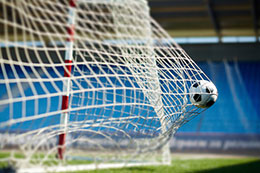21 December 2016
 From the inspirational to the directional to the entertaining – a listen to the linguistic practices that mark out the contemporary sporting landscape can be both fascinating and, at times, a little hard to decipher.
From the inspirational to the directional to the entertaining – a listen to the linguistic practices that mark out the contemporary sporting landscape can be both fascinating and, at times, a little hard to decipher.
Interpreting those practices is the focus of a new book The Discourse of Sport: Analyses from Social Linguistics, which, co-edited by UniSA linguistics expert Dr David Caldwell, examines language in a range of sporting contexts, from the action-orientated on-field practices of players, referees and coaches to the reflective post-match interview and commentary style of sports journalists and armchair pundits.
With chapters that delve into a range of topics, including the media fall-out from the racial incident involving Adam Goodes in 2015, and the integration strategies adopted by international football teams in which players and coaches with different languages and cultural backgrounds communicate with each other, The Discourse of Sport, highlights the growing significance and impact of sport as area for linguistics study.
Dr Caldwell says the language of sport comes in many different forms and that its “repertoire” has expanded considerably over the past few decades, especially with the advent of blogs, tweets, pre-game interviews and on-pitch language tracking.
“Whether positive or negative, sport provides significant landmarks in our individual and collective memories and public discourses,” Dr Caldwell says.
“Given how pervasive, influential and embedded sport is across multiple levels of society and culture, sport should be appreciated as a powerful cultural site of interest and significance for social linguistics.
“The language of sport comes in many forms: from casual conversations at the pub, to professional commentaries and highly formal editorials.
“One of the interesting features is that the language of sport is invariably linked to some sort of concrete, physical event that involves human beings competing with each other. And this means that the language practices are themselves often quite evaluative and competitive. We respond emotionally, we judge the capacity of participants, and we appreciate the aesthetics of sport.
“People give their opinions, evaluate participants (e.g. players, referees, etc.) and are generally passionate about the topic at hand. Compare for example a recount of your typical day at work, with how your favourite sports team performed on the weekend. Your recount of sport is typically more evaluative. Someone lost, and someone won. And what’s more, you have an allegiance to defend, critique, and unfortunately, often lament.”
In terms of how the vocabulary of sport has entered everyday language, Dr Caldwell says there are so many examples.
"What is interesting is that these classic ‘sport/language’ examples are often clustered into two main groups – the “inspiration sports speak”, and the “inarticulate sports speak” (the funny language mistakes made by players, commentators).”
It’s a funny old game….
Media contact: Will Venn office 8302 0096 mobile: 0401 366054 email: will.venn@unisa.edu.au


